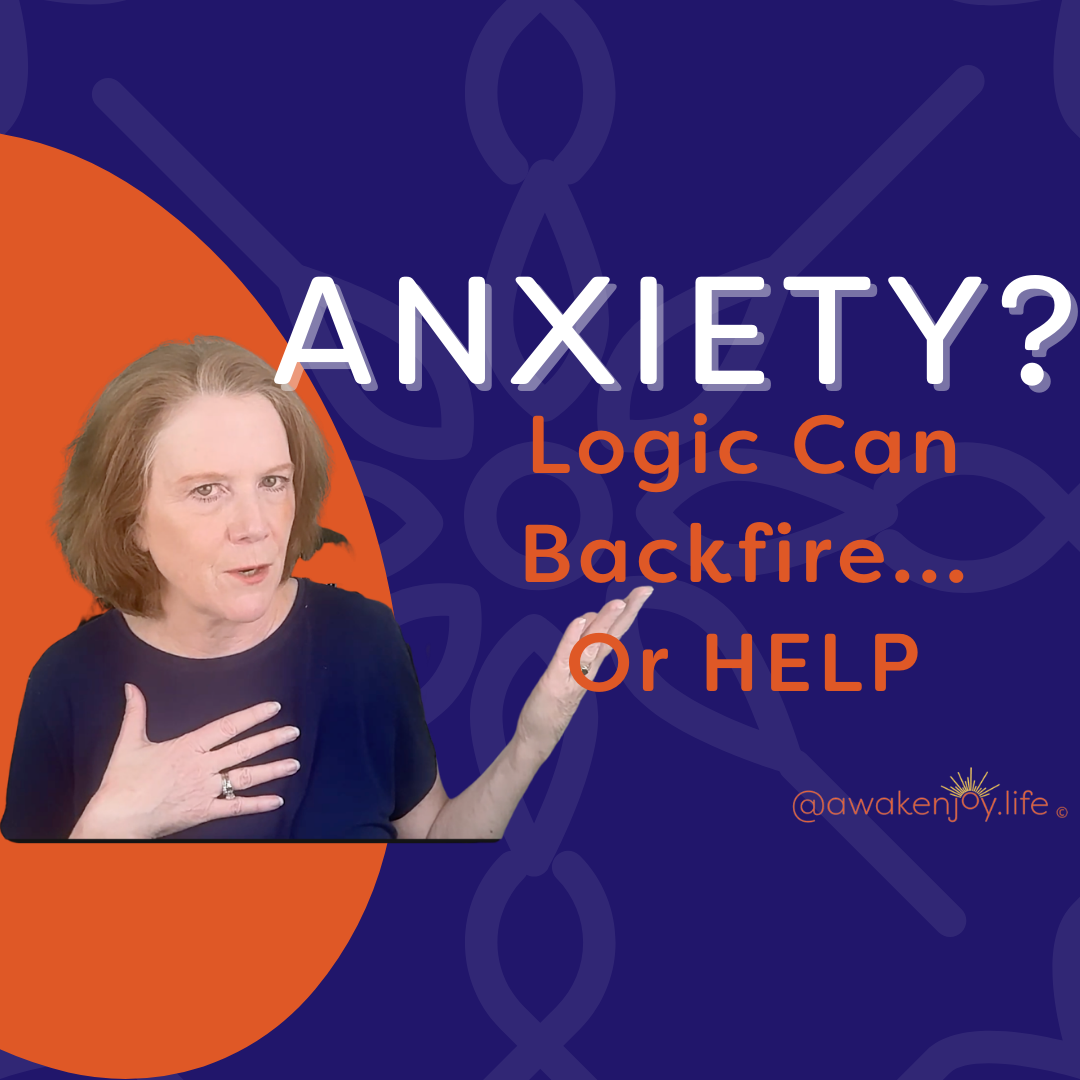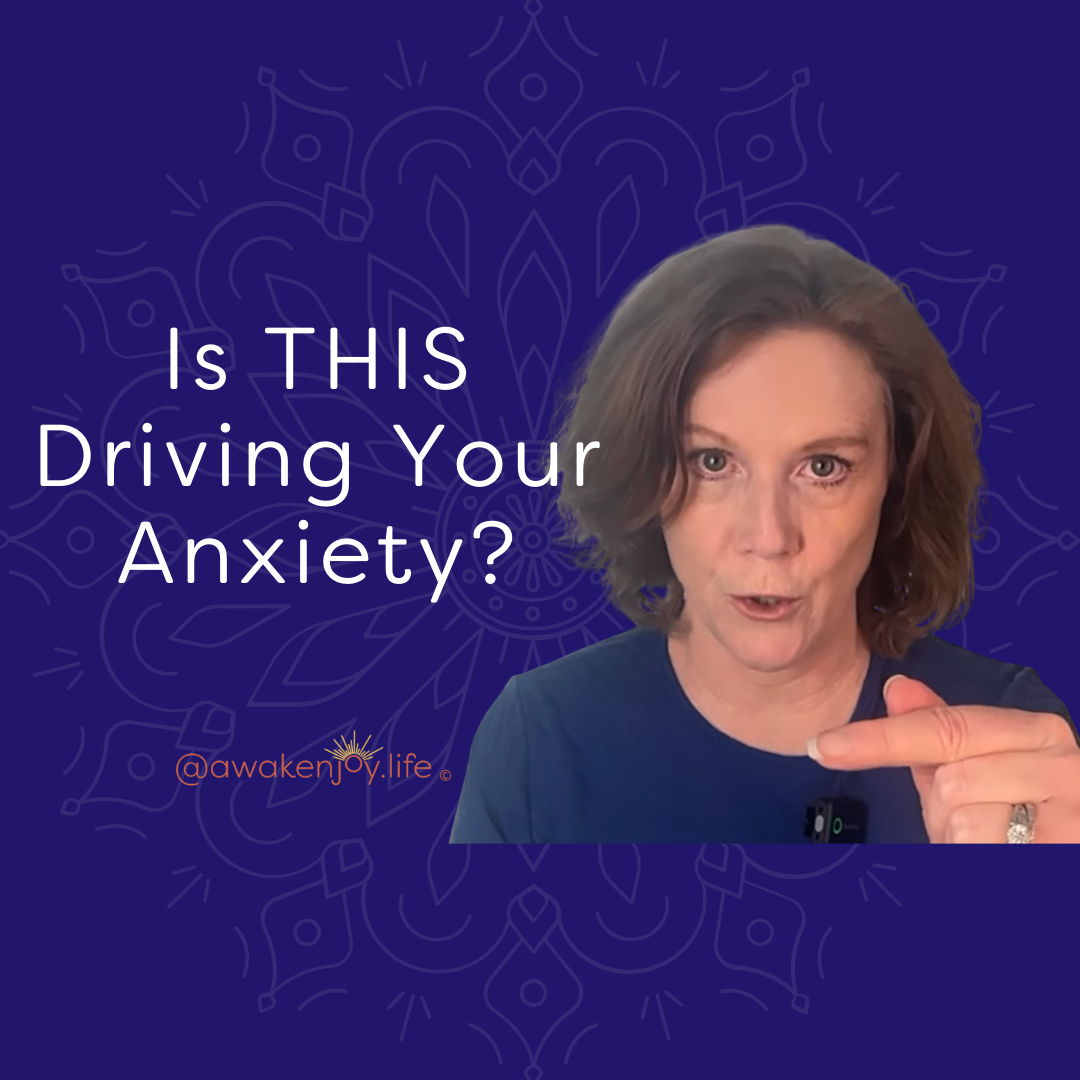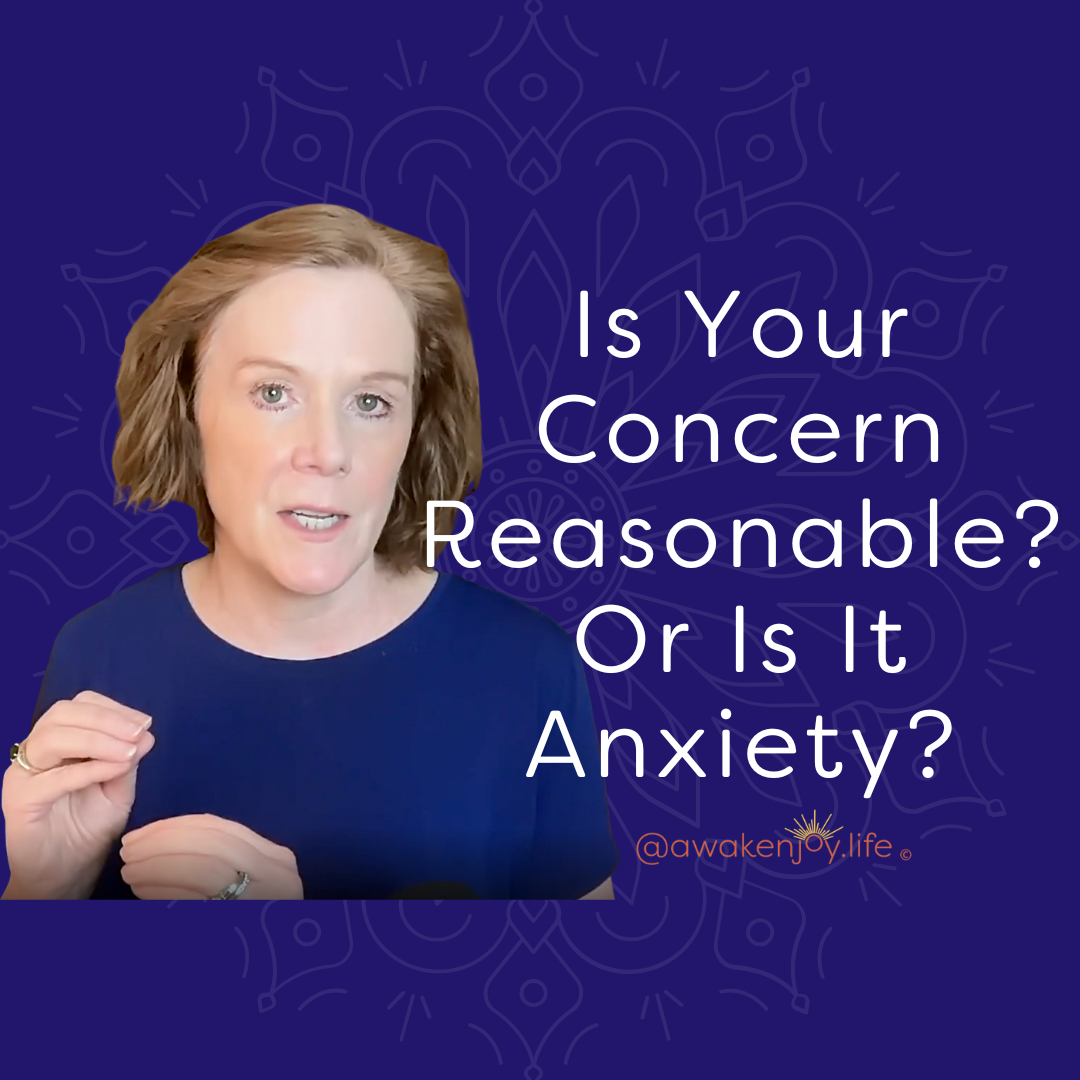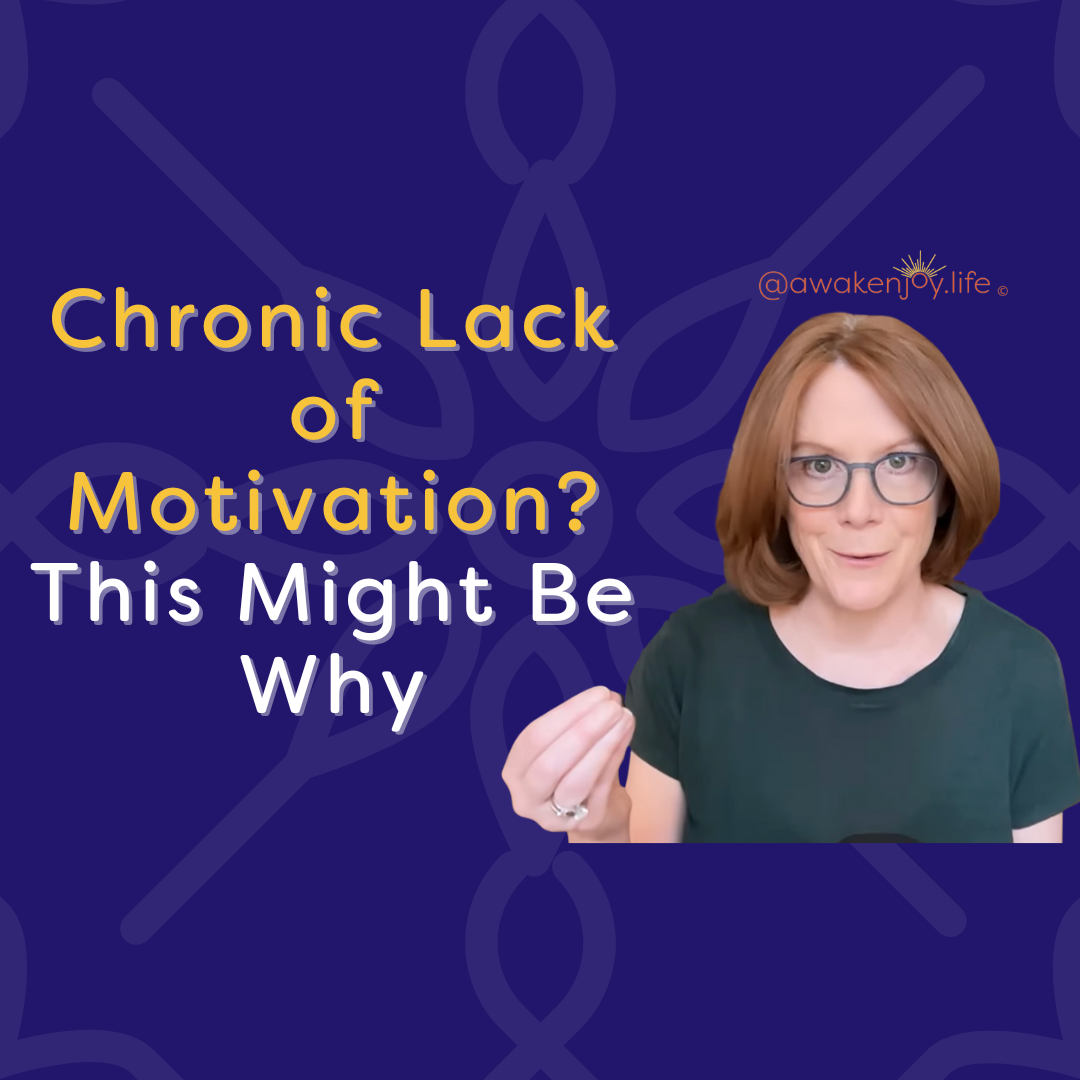The Cognitive Distortion of SHOULD Statements
Barbara Heffernan • December 11, 2024

When are “should statements” a problem, and when are they realistic?
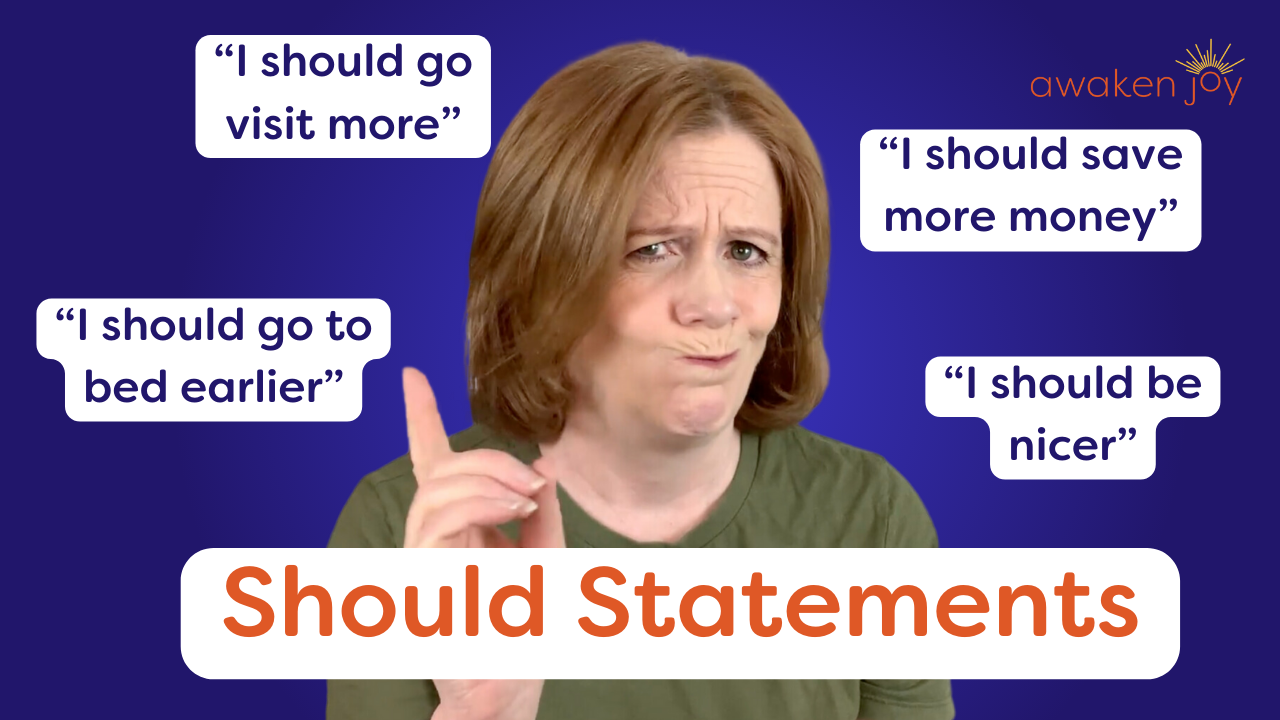
So the problematic should statements are those that make us feel bad about ourselves or those that make others feel bad about themselves:
So rather than “I should wake up earlier” it could be “I'm going to figure out how to structure things so that I don't have to feel all the time like I should wake up earlier. I'm going to make a choice here.”
- “I should be more productive.”
- “I should exercise more.” “
- I should wake up earlier.”
- “He should be nicer.”
- “She shouldn't have done that to me.”
- “She should really go back to school and get a better degree.”
Our should statements reflect our values and our judgments about the world, but they're often applied rigidly and critically.
In today's blog, I'll address why should statements can be a cognitive distortion, and what you can do about it!
So, a cognitive distortion is a "thinking error," which distorts how we are perceiving and interpreting reality.
So, a cognitive distortion is a "thinking error," which distorts how we are perceiving and interpreting reality.
If we tend to get stuck in uncomfortable mental states such as anxiety, rumination, depression, or habitual anger, we tend to have a lot of cognitive distortions.
And a distortion means it's distorted. It's not a true reflection of reality.
__________
So when is a should statement a cognitive distortion?
And when is it like, “Yeah, okay, time for me to go do my laundry”?
So I'm going to help you figure out when should statements are problematic, why they're problematic, and how to turn them around.
I got a comment on my recent video about cognitive distortions
from somebody who said that she's never understood why “should statements” are cognitive distortions. She used the examples of
- “I should eat something because it's 6:00 PM and I've yet to eat today.”
- “I should wash my hands before I prepare this food.”
- “I should get to bed because it's past midnight.”
These types of should statements are not
problematic. So how do you know?
With these should statements, there's a direct action, and you're pretty sure the person saying the should statement is going to follow through. So that's fine.
But this is not the type of should statement that most of us use.
Most of us use them more like these:
- “I should exercise more, I am so lazy.”
- “I should wake up earlier because I just can't get everything done and I'm just not being productive enough and I know I should, but I just can't and it makes me feel bad about myself.”
- “I should save more money, but I'm not going to because it gives me too much pleasure to go buy things and I know I'm going to keep doing that, but I know I should do that, so I'm just going to feel badly about myself.”
I imagine you can tell what the problem with these kinds of should statements are.
- They contribute to our low self-worth
- They don't move us towards productive action
- They don't help us reconcile the difference between what we are actually doing and what we think we “should” do
- They don't investigate the conflict inherent in the “should”
- They don’t help us change
- They make us feel badly
So if you are always “shoulding on” yourself or somebody else, what do you do about it?
I broke this out into five steps.
5 Steps to Stop "Shoulding" on Yourself
#1: Look into your values
Very often our “should statements” are based in values that come from society or our families of origin, and we don't really agree with them.
If you came from a family that was very academically focused and you don't really like academics and you want to be an artist or a construction worker, you might always be telling yourself “I should try harder at school, I should care about this, I should do this.” Because it's the message you got from your family or from the society you're in, but it's not what you really want.
So take the time to look through the values that are reflected in your should statements. What is the conflict in values that's reflected in these problematic should statements?
When you notice that you're “shoulding on yourself,” take out a piece of paper and a pen. Write down what you're telling yourself you "should" do, and then write down why you're not doing it, or why you're conflicted about it. And then look for what values are represented by both sides of that.
For example, “I should go to the gym more.” When investigated, the conflict might be “I'm totally exhausted. I worked all day, I'm taking care of kids. I don't have the energy.” That exploration gives you way more information than simply being like “Oh, I should go to the gym, but I'm sitting on the couch. I’m so lazy.” The investigation shines a light on the structural problem in your life that is getting in the way.
#2: Turn your should statements into choices
Instead of shoulds, use the language of CHOICE.
Let's take the should statement of “I should wake up earlier.”
Okay, where does this "should" come from? Some people are night owls, some aren't. We all have our own rhythms. Perhaps learning live with our own rhythms is helpful.
So rather than “I should wake up earlier” it could be “I'm going to figure out how to structure things so that I don't have to feel all the time like I should wake up earlier. I'm going to make a choice here.”
Let's look another example: "I should be nicer” . Once you've looked at the values and the conflict inherent in this statement and in the situation, consider whether it is actually a boundary that is needed. It could be: “I'm choosing to set a boundary with a friend, even though it kind of makes me feel a little bit like I'm not being nice or I'm not doing what I should do. I'm going to set a boundary because not doing so is having a negative impact on me.”
You can take your “should statements,” analyze the values and inherent value conflicts, and then make a choice.
#3: Turn the choices into action
Let’s start with: “I should save more money.”
Let’s say you go through your values and you realize that you don’t highly value what you are spending money on and you do value feeling more secure. You feel that saving money will help you feel more secure, and this is an important value.
“I'm going to have a certain amount automatically deducted from my paycheck.”
“I will put in place boundaries for myself around how I spend money”
If you find that your “should statements” do actually reflect your values and what you want, make a plan.
#4: If needed, let the “should statements” go
If you find that the “should statements” don’t reflect your true values, or if you find that they are too rigid and perfectionistic, it probably makes sense to consciously let them go.
Let's take the “I should be nicer,” or “I should never say no to somebody” or “I should always help everybody around me who's in trouble, whether they ask for it or not.”
These are unrealistically broad. You can value being nicer, but also value self-care. You can value helping others, but also value letting others be responsible for themselves.
Letting go is a practice, and it takes some time. But acknowledging that your “should statement” is not valid or helpful is a first step.
#4: Understand the negative core belief reflected in your “should statement”
Knowing and understanding your negative core belief is key to a healthier way of thinking and a healthier way of navigating the world. We develop these beliefs at a young age and they impact much of our behavior and experience, until we recognize and heal them.
So a belief of “I should be nice to everybody” probably arises from a negative core belief that “my needs don't count” or “other people's needs are more important than mine.”
If your should statement is “I should always be helping everybody else in my family, whether they've asked for it or not,” you probably have a negative core belief that you can't rely on others. You've developed a belief and habit that somehow it is your job to be the competent one, and that if you don't "jump in and help, everything's going to be horrible."
This fifth step of recognizing what negative core beliefs are under these should statements can really help you deeply understand why you have this internal dictator in your head.
The internal dictator is always beating us up “You should be nicer, you should be smarter, you should work harder, you should be more productive, you should be able to get everything done.” This internal dictator was internalized, probably from a critical parent or a general atmosphere that created this belief in us. This blog will probably be interesting to you if you resonate with this: Inner Critic
So for help on this step, the negative core belief, I do have a free PDF. It helps you identify the negative core belief and then it also gives you tools to overturn that belief.
To conclude,let's go back to the other should statements that really aren't problematic.
“I should go do my laundry because otherwise tomorrow I'm not going to have any clean clothes.”
There's no huge criticism in that. There's no huge conflict. I may not feel like doing the laundry, but I know it's the best choice given the consequences if I don’t.
Those should statements are not problematic, but I would still recommend rephrasing them with the language of choice.
“I'm choosing
to go do my laundry now. If I don't, I won't have clothes for tomorrow.”
Alright, let me know what you think of this and whether it was helpful . If you have any questions let me know!
Blog Author: Barbara Heffernan, LCSW, MBA. Barbara is a licensed psychotherapist and specialist in anxiety, trauma, and healthy boundaries. She had a private practice in Connecticut for twenty years before starting her popular YouTube channel designed to help people around the world live a more joyful life. Barbara has a BA from Yale University, an MBA from Columbia University and an MSW from SCSU. More info on Barbara can be found on her bio page.
Share this with someone who can benefit from this blog!
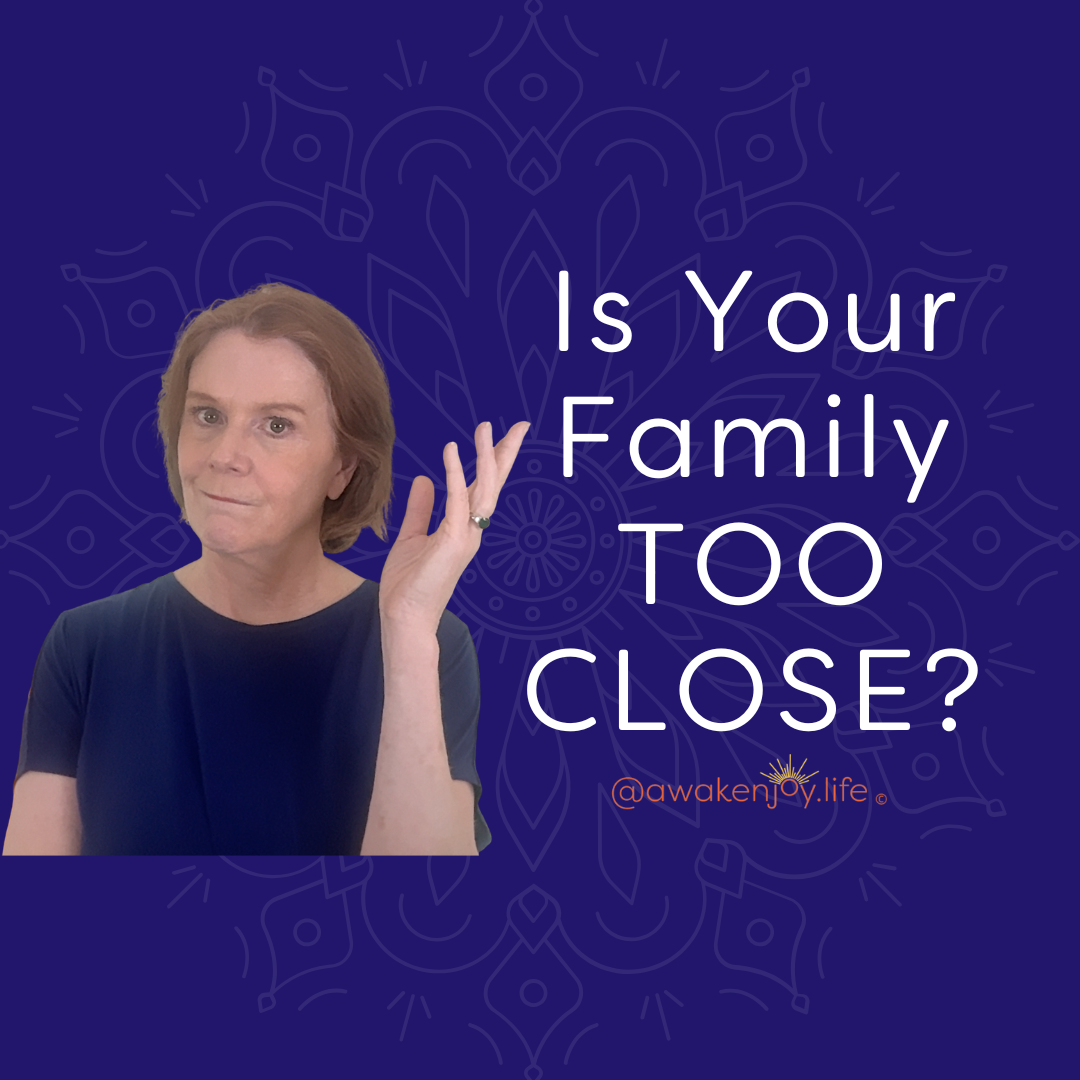
While closeness is wonderful and healthy, there's a point where family closeness can cross into something problematic called enmeshment. In an enmeshed family, individual identities blur, boundaries disappear, and family members aren't allowed to truly become the individuals they were meant to be. Here are seven warning signs that your family might be too close—and what that really means. Warning Sign #1: Different Beliefs Equal Betrayal Voting differently, trying out a new religion, or even having different financial priorities—it's not just that your family system disagrees with your choices. They treat those choices as an actual betrayal of them personally. Healthy families can discuss different viewpoints and allow each other to differ, because we all do differ. But an enmeshed family requires that all family members follow the same sets of values and priorities. Deviation isn't seen as natural individual development—it's perceived as disloyalty. Warning Sign #2: You Can't Be Happy Unless They Are This might also apply to other family members. For example, your mom can't be happy unless everybody else is doing well—or maybe her happiness requires that they are all doing what she thinks they should be doing. It might be that you absorb other people's emotions as if they're your responsibility. There are important subtleties here. Of course, we're all happier when our loved ones are happy. But we can't control other people's emotions. We can sometimes influence them, but it shouldn't reach the point where we are sacrificing our own critical values and needs. In an enmeshed family, there are usually one or two family members who absorb everybody's emotions and then try to take care of all those emotions as if it's their own responsibility. Warning Sign #3. There's a Double Standard Around Secrets In an enmeshed family, each individual within the system is supposed to keep nothing back from the family. If something is hidden, it would probably be seen as another betrayal. However, you're definitely not allowed to tell people outside the family what's happening inside. This is often to hide family dysfunctions—whether that's alcoholism, mental health issues, abuse, or personality disorders. Obviously, none of us want to spread our personal information everywhere. But being able to confide in friends, supportive people, and therapists is very important for health and growth. Enmeshed families prevent this kind of external support. Warning SIgn #4: Your Successes Are the Family's Trophies and Your Failures Are Their Shame The family system will have a particular way they want you to achieve. Your achievement is not r eally about them being proud of you and happy for you in terms of you achieving the goals you have in life and living the way you want to live. It is more about it being a trophy for them that can make them feel good and look good. Examples of this might include choosing a college major because it makes your parents happy or proud, or pursuing a career that you really do not want but you know will make them happy. This goes beyond the normal conflicts we all have—deciding between a more secure path versus something more fulfilling. All families, healthy or not, will likely have opinions on these topics. But in enmeshed families, it is not just advice. It is "you have to do that or else we will not feel good about ourselves. It will make us look bad." Warning Sign #5: Independence Is Punished In working with people over 20 years as a psychotherapist, I often saw people become aware of the enmeshment in their family once they had chosen a partner in life and begun to form their own nuclear family. TThe enmeshment would be highlighted by their partner. For example, a partner might say, "I love your family and they are great, but no, I do not want to spend every single Sunday with them" or "I cannot spend every holiday with them. We also have to spend holidays with my family." A partner might feel neglected if the enmeshed person is spending too much time with their family of origin. Yet, if the enmeshed person changes their behavior or priorities, there is a crisis in the family. However, please be aware that there are subtleties here! As a mom of young adults, I deeply understand that it can be very sad if one of your children moves across the country. Sometimes the choices a young adult makes might make a parent worry a little more or feel down - and that probably falls into the completely normal category. But if that young adult is made to feel like they are a bad person for the choice they are making or that they are directly their parents, then that is a significant warning sign. (Note: This discussion does not really apply to adolescence. The struggle with adolescents is different. There is often a pull for independence from the adolescent that might feel dangerous to the parent, and a caring parent is going to pull them back. Most of my material is geared toward adults—young adults all the way up to much older adults.) What Is Enmeshment? Before continuing with the remaining warning signs, let me define enmeshment. An enmeshed family system is one in which people are not allowed to truly individuate—to truly become the individuals they were meant to be. If you are new to my content, you will understand that I am not a big fan of the slogans and easy answers you often get online, because these things are not simple. But I want to give you the concepts to begin thinking about so you can decide what is the next step for you to grow, heal, and become the individual you want to be. Warning Sign #6: Someone in Your Family Is Playing the Wrong Role For example, perhaps a child is being a parent to the parent, or maybe one of the two parents is a parent to the other parent. Or perhaps there is too much emotional sharing from a parent to a child, where a child is inappropriately made a confidant of the parent. In enmeshed families, roles develop usually when the child is very young. That child will develop into a particular role, and these roles are rigidly enforced by the family system. People are not llowed to grow and change outside of those roles. Warning Sign #7: Control Is Disguised as Concern Concern is lovely. We all have concerns about loved ones and their choices. We might even sometimes express those concerns. But we are not harping on them, repeating them, threatening relationship cutoffs, or taking them super personally. We are not employing manipulative tactics to get the person to do what we want them to do. But in an enmeshed family, the concern will be manipulative. It will be communicated and then enforced in a very heavy-handed manner. What This Means for You If you have recognized three or more of these signs, it is worth looking into whether your family system is enmeshed. Now, this does not mean you have to leave your family. It does not have to mean anything dramatic other than you have named a potential problem or issue. Recognizing an issue like this is the first step toward healing and toward your own personal growth. You can both love your family and recognize that some of these patterns are not healthy. This is also not about blaming your family, because many of these patterns are intergenerational. They have been passed from one generation to the next to the next. Your Next Steps The next step for you is to learn more about what enmeshment is. I have a whole playlist on this topic that you can access here . I also have videos on dysfunctional family roles—what they are, what they mean, and how you heal from them. Just remember: closeness is wonderful, but closeness allows you to be yourself. Enmeshment requires you to hide parts of yourself, sometimes even from yourself. Understanding this and understanding why this happens is critically important for your personal growth, happiness, and healing. A Question for You I am curious: Did you begin reading this because somebody else told you that they think you are too close to your family? Or were you beginning to feel suffocated by your family system? Or was there another trigger that got you to begin looking into this issue? Please share in the comments. Let me know if you have any questions. I love to hear from you!

Maybe you're always the one everyone turns to for help, or perhaps you're the one who always seems to cause problems no matter what you do. You might feel like you can't quite be yourself around your family, or that you automatically fall into certain behaviors when you're with them—these may even be behaviors you've decided you don't want to repeat anymore. If this resonates with you, you're not alone. Many people find themselves operating in rigid patterns that developed in their families of origin. These patterns made sense when you were younger—they helped you navigate your family dynamics and stay safe. But now, as an adult, these same patterns might be limiting your relationships, your sense of self, and your ability to live authentically. The good news is that recognizing these patterns is the first step toward change. Here are nine signs that you might be stuck in a rigid role from your family system. 1. You Operate with a Lot of "Shoulds" and "Have-Tos" Particularly with regard to your family, you find yourself constantly thinking: "I should do this. I should not do that. They should do this. They have to. I have to." These thoughts and phrases reflect a rigid family system with very particular rules and roles. The constant "shoulds" indicate that you're operating from internalized expectations rather than from your authentic desires and values. 2. You Regularly Feel Guilt and Resentment Particularly when it comes to your family system, you might feel like you have an internalized programming of guilt. Anytime you want to assert yourself or express a need, anytime you want to set a boundary or say no to something, you feel guilty. It might even be that your very existence makes you feel guilty within the family system because it seems to create so much havoc. These guilt feelings usually bring with them substantial resentment. You might resent the role you're forced to play within your family. You might resent the way you're treated, which might be different from how other people are treated. The resentment is tied to feeling that you're required to do something that either doesn't sit well with you or that other people aren't required to do. This connects directly to the first sign—all those "shoulds" and "have-tos." 3. You Have Automatic Behaviors and Emotional Responses When you're around your family or when you find yourself in a situation that mirrors your family of origin, you might suddenly find yourself doing something you've really decided you don't want to do anymore. Whether that's saying yes when you don't want to, exploding in anger, or shutting down entirely—these automatic responses that we develop when we're young because of the family dynamic stay with us for a long time. These reactions happen before you can consciously choose a different response. It's as if your body and emotions remember the old patterns and fall back into them automatically, even when your rational mind knows better. 4. You Feel Your True Self Is an Inconvenience You've probably been conditioned to feel that your beliefs, needs, and desires are actually secondary to the family system. You might hide parts of yourself from your family. You might feel like you have to present a false self to your family and perhaps in many other situations as well. This sense that who you really are is somehow too much, not enough, or simply unwelcome keeps you from showing up authentically in your relationships. 5. You Don't Really Know Your True Self This depends somewhat on where you are on your healing journey. If you've done substantial healing work and spent time analyzing the role you played and making changes in your behavior, you might feel like you do know your true self—you just can't let it out or can't seem to access it when you're within your family system. However, if you're at the beginning of your journey, you might feel like you don't even really know who you are. The reason for this is that when we hide parts of ourselves from our family system and learn to do this as children, we actually cut those parts of ourselves off. This connects to all those "shoulds," "have-tos," and "should-nots" because you can not exhibit the traits or behaviors that go with the cut-off parts. For example, if we cut off the part of ourselves that feels needy, we might develop a belief that "I should not prioritize my needs. I should not express my needs. I should not appear needy at all." Because we learned very young that we should not be needy, that part of ourselves becomes completely cut off. Yet, we all have needs. 6. You Feel Love Is Conditional and Must Be Earned This feeling probably extends to all your relationships, even those outside your family system. But it arose from a pattern of being within a family where you felt that love and acceptance—the ability to be cared for or valued—was tied to how well you fulfilled the family's expectations and how well you performed your role. You learned that love isn't freely given; it must be earned through compliance, achievement, caretaking, or whatever your particular role demanded. 7. You Feel Inherently Flawed in Ways Related to Your Role Let me highlight some of the common rigid roles within dysfunctional family systems and the deep-seated beliefs that often accompany them: The Caretaker If your role is the caretaker, you might have very deep-seated beliefs that "my needs don't matter" or "my needs are not as important as other people's needs." You might also believe "I can't count on anyone else" or "I'm not worthy of being cared for." The Hero Child If you were the hero child, you might believe that you're only worth as much as your achievements. While this might seem to the outside world like a positive trait—after all, you learned to achieve—it can actually leave you feeling very insecure, empty, and deeply lonely. There might also be an underlying feeling that "inherently I'm worthless if I don't keep doing these things and achieving." This can create intense anxiety—even unconscious or subconscious anxiety—about what happens if you stop achieving. The fear becomes: "If I don't keep achieving, then I truly am worthless and nobody will love me, not even myself." The Scapegoat The scapegoat in the family generally feels like they are inherently bad. No matter what they do, they're bad—so why bother trying? The Lost Child The lost child probably has a deep feeling of not being important, of almost being invisible. Changing These Beliefs: A significant part of the healing work to recover from these dysfunctional family roles and reclaim those other parts of yourself so you can live a fuller life is healing these negative core beliefs. If you're new to my content, I have a free PDF, Transform Your Negative Core Beliefs . It helps you identify what your true deepest core beliefs are and gives you three methods for transforming them. Many people have shared that it's been incredibly helpful. 8. You Recreate These Patterns in Your Adult Relationships You might find yourself in midlife suddenly realizing, "I'm still playing this role now in this new family that I have." Perhaps you married someone who is just like one of your parents or siblings—or some odd combination of those. No matter what, you're still in the same role. You might also find the behaviors that go with this role showing up in your work environment or with friend groups. Becoming aware of how and where you're recreating this pattern outside of your family system is incredibly useful for your healing journey. 9. You Feel Extreme Anxiety When You Try to Change These Behaviors You might feel this anxiety and discomfort when you're changing the behavior within your family system, but you might also feel it when you're trying to change behaviors with a friend group, at work, or with your partner at home. That learned and deeply embedded reactivity—whether it's anxiety, rage, or shutdown (the freeze state)—reflects the fight-flight-freeze response. Our deepest survival response can emerge when you're trying to change behaviors, even if your frontal lobe knows it's the right thing to do and wants to do it. This deep reactivity also points toward the solution: to change these behaviors and truly begin living the full life you want, learning to calm your reactivity is critically important. Suggestions Based on Where You Are on This Journey If this is new information to you but you're not really sure exactly what your role is, I'd like to point you to my video and blog on dysfunctional family roles ( Video Here , Blog Here ). From that video, you can access the videos I have on all the specific dysfunctional family roles—the scapegoat, hero child, mascot, and lost child. Each one of those videos has healing steps within it. If you're partially on your way on this journey—meaning you know what your role is and you've been trying to change it but you're frustrated either with your family, yourself, or both because you don't seem to be able to change it—I just released a video for you called " Why Is It So Hard to Change My Role? " and the blog is Here . For everyone, I just released a video and blog that will help you break out of this restricting role: 7 Steps to Break Free from Dysfunctional Family Role video and the blog is here. Final Thoughts Recognizing these signs in yourself is not about shame or blame—it's about awareness and empowerment. These roles developed for good reason when you were young. They helped you survive and navigate a challenging family system. But now, as an adult, you have the opportunity to choose differently. Please share your thoughts in the comments. Was this helpful? Which signs resonated most with you? I'd love to hear from you.
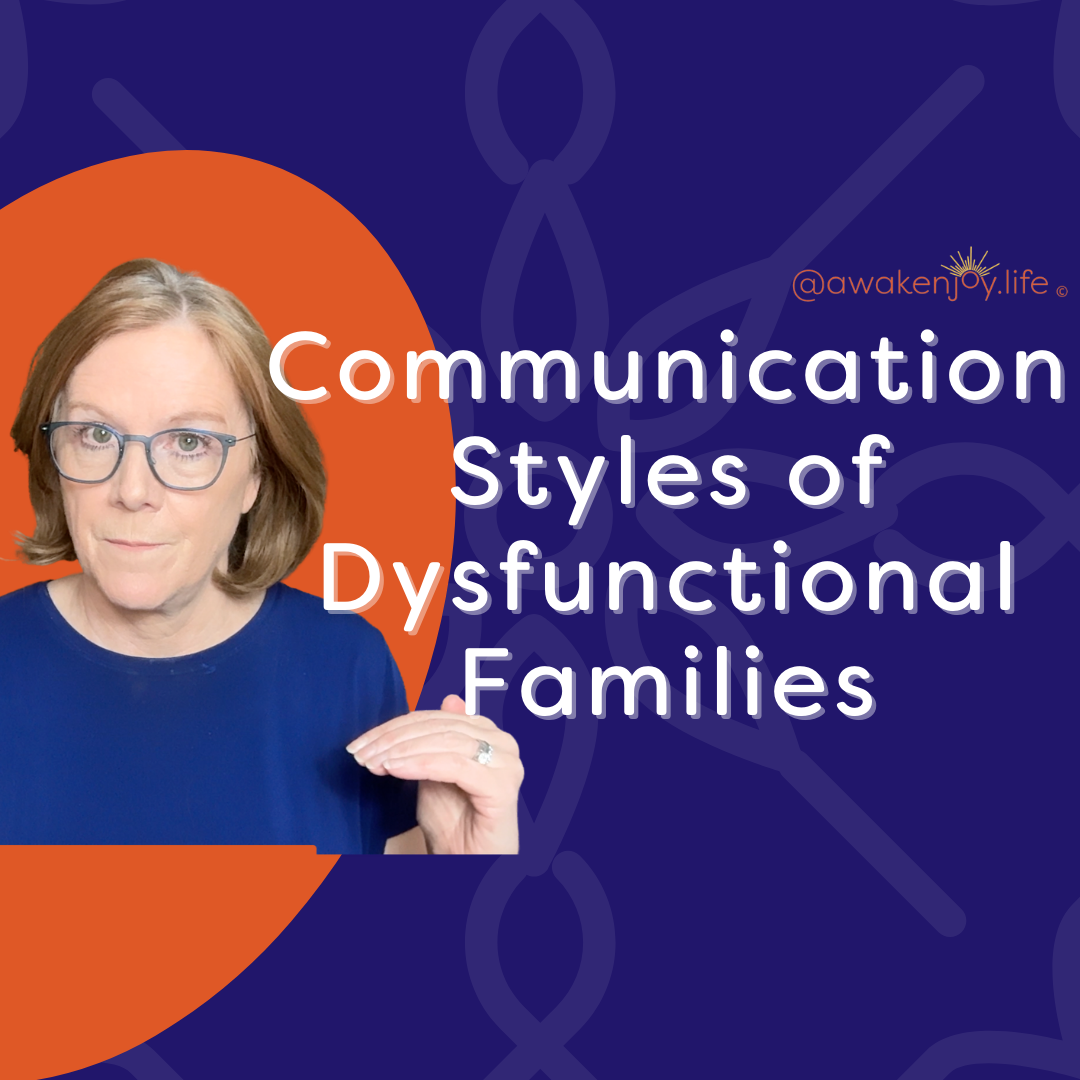
Four communication patterns are common in dysfunctional families. Move from the dysfunctional communication style to a healthy communication pattern. This is based on the groundbreaking work of Virginia Satir who identified the placater, blamer, distractor, computer and leveler communication styles common to families
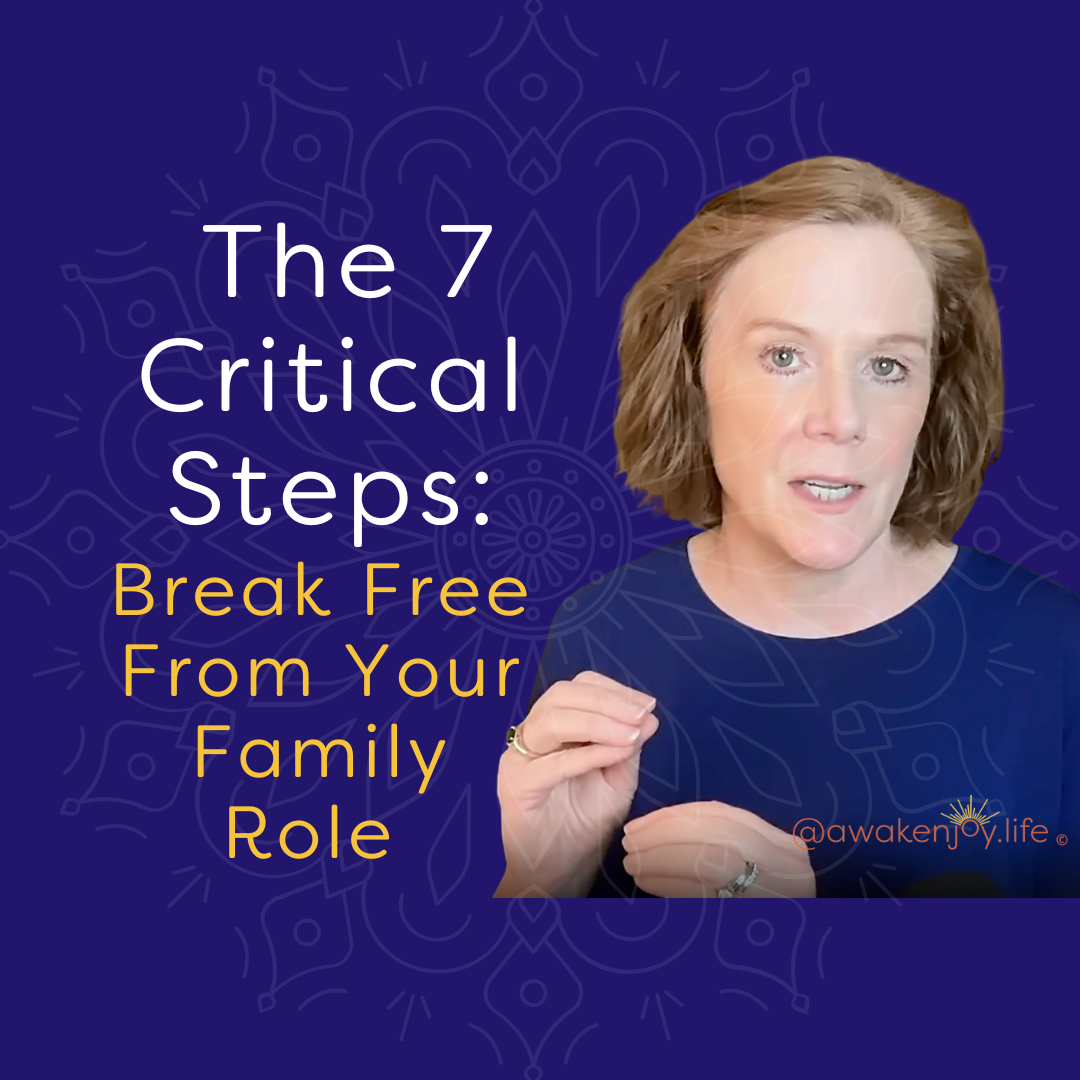
Breaking out of a dysfunctional family role you have held for years—perhaps decades—is one of the most challenging psychological transformations you can undertake. It is difficult, yet, it is achievable. It requires a fundamental shift in how you understand this process and what you can realistically expect. I am going to guide you through seven critical steps, and I encourage you to read through till number seven because it is rarely discussed, yet absolutely essential. Step 1: Focus on What You Can Control This requires a fundamental shift away from thinking about changing the family system or how particular family members respond to your changes. Instead, redirect your focus entirely toward your own healing and growth. You have likely heard this before, but I want to explore it more deeply to help you understand why it is so crucial. I understand the feeling: "But they will not let me change." And I know that it is not easy to face family resistance to your change. To begin this work, shift your focus to these questions: What do I need to heal? What behaviors do I need to change? What beliefs and concepts do I need to release? Here are the specific, concrete steps. Step 1: Analyze the role you have occupied You might already have identifyed the role you have had, and looking into it more deeply will help you determine which behaviors you'll need to change. Then establish a personal boundary around changing that behavior. This provides clarity about what you can do differently within the family system. I will return to this with additional guidance. Breaking out of a rigid family role is fundamentally about individuation—becoming fully the person you are meant to be. Step 2: Reclaim the Parts of Yourself That You Suppressed For each typical family role, there are aspects of ourselves that we suppress. We learn not to reveal those sides of ourselves to our family when we are young. Over time, we move beyond mere suppression to complete rejection of those parts. For example, the caretaker child severs their awareness that they have needs. Their neediness becomes suppressed. The internalized message is: My job is to take care of others, not to receive care. But we all possess the need to be cared for. If you have rejected that part, healing requires reclaiming it. The hero child who must achieve constantly to maintain family equilibrium has likely suppressed the part of themselves that resists such pressure, that simply wants to relax occasionally, that wants to play without purpose or goal. The scapegoat has probably suppressed their own desire to achieve. Why invest effort in achievement when blame is constant and a sibling already occupies the hero role? It feels futile. Yet we all possess parts that crave recognition, and being productive helps us feel good about ourselves. The lost child has likely suppressed the part that wants to be heard, seen, and recognized. We all possess all of these dimensions. Healing means permitting yourself a full range of feelings and multiple behavioral options appropriate to different situations. The healing work of embracing all aspects of yourself is fundamentally important. Step 3: Heal your Negative Core Beliefs Each role generates negative core beliefs. Let me address a common question: Obviously, not every family contains six members to fill each role. People frequently assume multiple roles. Sometimes, following a major family system change, your role might shift over time. But generally, the role you occupied earliest establishes the negative core belief that persists throughout life. Those negative core beliefs might include: My needs do not matter. I cannot trust others. I cannot rely on others. I am invisible. I am unlovable. I am bad. I have a free PDF (if you have not yet downloaded it, you can find it here: Transform Your Negative Core Beliefs ). It helps you identify your deepest core belief and provides three methods for transforming it. Step 4: Establish Internal Emotional Boundaries Boundaries are not solely about refusing requests, dictating how others should behave, or communicating what you will not tolerate. The far more important boundary work is internal. When we develop within an enmeshed family system—and rigid roles guarantee enmeshment exists—we lose the ability to distinguish our emotions from others' emotions. We absorb others' emotions too intensely and then assume responsibility for them. Either we believe we caused those emotions or we feel obligated to manage them. The emotional boundary work is essential. I dedicate substantial time to this in my boundary program , and I will provide more information later in this article. This requires considerable work, and I will direct you to YouTube videos that can assist as well. Step 5: Build a Support System Outside Your Family External support is critical for multiple reasons. When you are raised within a particular system, it is hard to be confident in your new beliefs and opinions. External validation is crucial: "Yes, that is dysfunctional." "No, you should not be required to do that." "No, that treatment is not acceptable." I want to be clear about blame. Blame perpetuates the dysfunctional system. But awareness and fact-finding are very important. I consistently encourage fact-finding regarding your family system, not fault-finding. Fault-finding is easier. Fact-finding asks: How did this affect me? What did I internalize? Where do I struggle to see beyond the framework I was raised in? What rules do I still follow despite rejecting them intellectually, rules that continue driving my behavior? For all these reasons, external support is essential. This might include a therapist, counselor, coach, or supportive friends. Building this support or identifying people who can support you in this process may require effort, but it is worth investing that time. Step 6: Practice Assertive Communication and Discover Your Voice Learning to communicate in a calm, clear manner that respects both yourself and others is essential. Aggressive communication disrespects the other person. Passive communication disrespects yourself. Assertive communication operates from the principle: I'm ok, you're ok. Begin practicing assertive communication outside your family system. Practice with friends or other people in your life first. When you begin practicing with your family, start small—address minor issues initially. The boundary program I offer includes an entire section on assertive communication. Numerous other resources exist, but what matters is beginning practice with the understanding that practice is necessary. It functions like exercise. You must repeat it consistently until it becomes comfortable and natural. Step 7: Leverage the Strengths of Your Role Without the Rigidity Every typical role within a dysfunctional family possesses significant strengths. The goal is transforming these behaviors from automatic compulsions into conscious choices—not reflexive obligations or "shoulds," but genuine choices. This role has protected you for years, perhaps decades. It has shaped substantial aspects of your personality, and you do not need to abandon all of it. Moving toward authentic individuation means developing the capacity to choose behaviors appropriate to specific situations at particular times, and choosing different behaviors at other times. For example, the hero child and caretaker child have developed considerable self-reliance and strength. They likely excel at problem-solving and may be exceptional in crisis situations. But learning to trust others, learning to accept your vulnerability so you can cultivate genuine intimate relationships—not necessarily within your family of origin, but in your adult life—means releasing the requirement to always be the strong one. The scapegoat has likely become a truth-teller. This is a valuable capacity for advocacy, both self-advocacy and advocacy for others. Many changemakers in our world - advocates for underserved populations - were scapegoats in childhood. The mascot has developed a wonderful sense of humor and likely possesses strong skills in helping others feel at ease. That aspect of your personality need not be relinquished. It brings pleasure to many. But developing deeper relationships probably requires stepping out of that role periodically so you can address conflict directly, listen to others' difficulties without deflecting through humor, and acknowledge your own loneliness and perhaps your feeling that nobody truly knows you. Accepting your own vulnerability is essential. The lost child has probably developed substantial self-reliance as an adult and likely possesses considerable creativity. But learning to trust others, learning to accept appropriate dependence enables you to find people you can rely on and people with whom you can be authentic, so you can express your voice and bring your creativity and special talents more actively into the world. Additional Resources Family systems resist change profoundly. I released a comprehensive video and blog on this topic last week, which I will link ( Blog: Dysfunctional Family Roles: Why Is It So Hard To Change? and Video here ). Understanding why family system change is so difficult reduces the self-blame we experience when we feel stuck. It can also shift blame away from the family system because these patterns are transmitted intergenerationally. Depending on your current position in this journey, here are additional resources: If you are uncertain what the dysfunctional family roles are, I have a video explaining them . If you want to understand enmeshment more deeply, I have videos addressing that concept. Therapy helps, coaching helps, but I recognize they are time-intensive and expensive. That reality led me to create an 8-week boundary course accessible from anywhere. The cost is probably less than two therapy sessions. Let me share feedback from three people who completed the program - these testimonials are taken directly from the google doc I created to gather feedback: "Your great program is really a lifechanger. It is not just a slogan." "Everything was very helpful. I am a much different person in a good way than I was eight weeks ago." "I have been helped to look underneath all of the unhealthy messages and negative core beliefs that I picked up in childhood and throughout my life. Really, just lots of wonderful, empowering information. Thank you so much for your compassionate and important work."" If this material resonates with you, I encourage you to explore that course. Information is here: The Ultimate Boundary Course . Let me know your thoughts on these seven steps and whether this article has been helpful. I will see you next week.
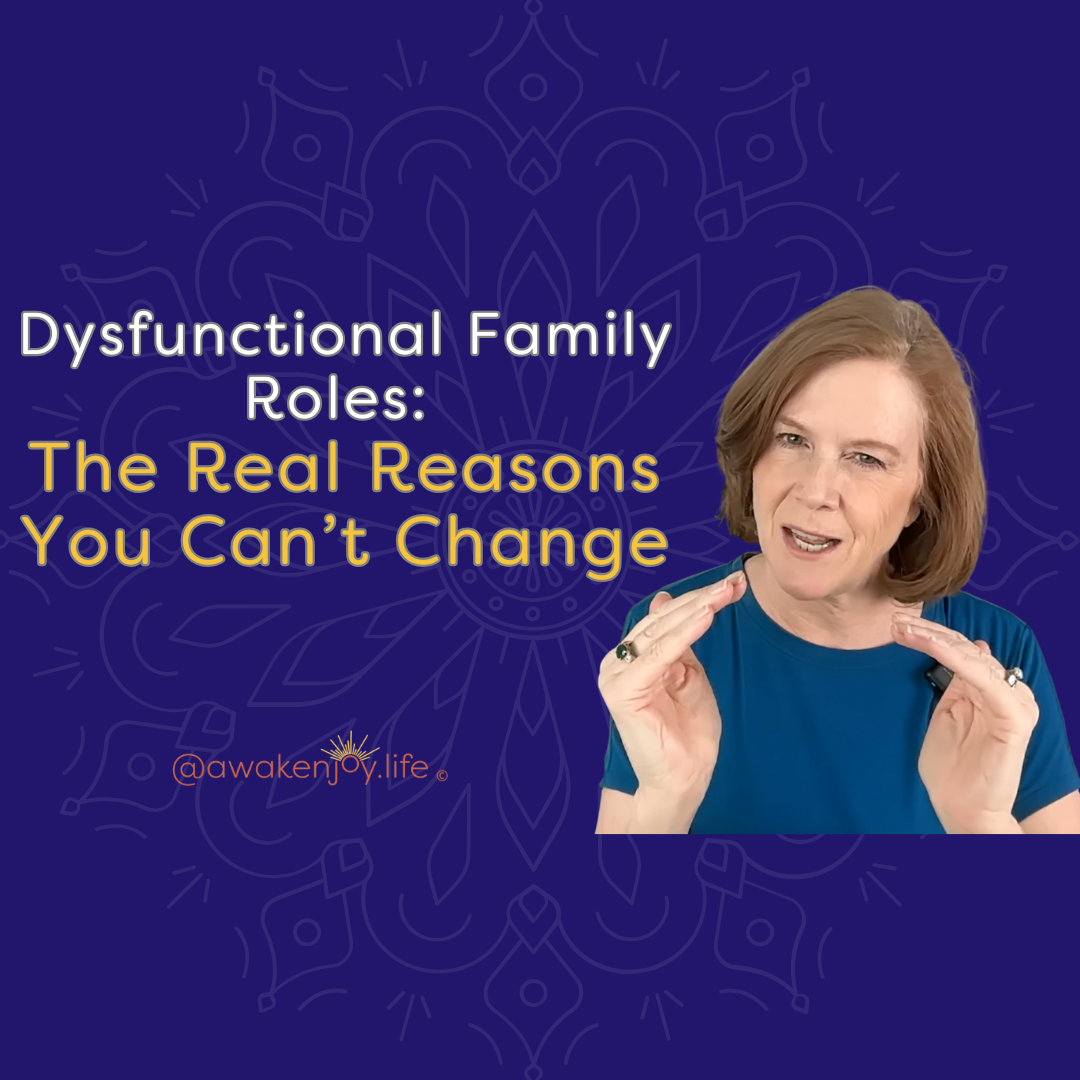
Do you keep finding yourself back in the same patterns, performing the same behaviors, playing the same part? Do you feel angry at your family for refusing to accept your changed behavior? Or do you direct that frustration inward, berating yourself for repeatedly falling into those familiar grooves? This frustration is not a personal failing. There are well-researched, deeply rooted reasons why escaping dysfunctional family roles is extraordinarily difficult. Understanding these reasons—both the external forces that pressure you to stay in your role and the internal patterns that keep you locked in place—is essential for meaningful change. When you understand why the path is so difficult, you can navigate it more effectively. There are reasons external to you that make change difficult, and there are internal reasons it is challenging. Let's start with the external reasons. External Reasons Why Change Is Difficult 1. Families Are Systems, and Systems Resist Change The most significant external obstacle is that families are systems, and systems are profoundly resistant to change. If you consider how challenging it is for you as an individual to change in any context, then imagine that difficulty multiplied exponentially when you place multiple people together in a system. The difficulty quotient explodes. When one person changes within a system, it requires everyone else in that system to adjust. Systems inherently attempt to maintain equilibrium and sustain themselves. When we think about the family roles that developed, we can envision being in a play. Everyone has their assigned role. Everyone wears the same costume. Everyone knows their lines. If you recently came home from holidays with your family, this will resonate because you know which person will get angry, which person will disappear, which person will criticize you, which person expects you to do everything perfectly. You know all the roles. If you were in a play wearing your costume, and everyone had rehearsed their lines, what would happen if someone walked on stage and started doing something completely different? You would probably feel confused, possibly angry. How can they just change their role? What does it mean for my role? What if someone starts playing my role? What does that mean for me? This analogy illuminates why system change is so challenging. Compounding this difficulty is the fact that these roles have been transmitted from one generation to the next to the next. Dysfunctional families emerge around major stressors, whether those stresses originate externally or internally. The dysfunction develops as a response to extreme stress, and this pattern has repeated for generations. Change is possible—though the change may not manifest exactly as you envision it. 2. Family Enmeshment and Pressure to Stay in Your Role The next obstacle involves family enmeshment and the pressures exerted on you to remain in your role. In dysfunctional families, roles become rigid and people become intensely attached to their own role and to the roles of others. The family system employs specific tools to keep you in your designated place. Often that tool is shame—shaming you for changing your behavior or shaming you for not helping or fulfilling your expected duties. The pressure might manifest as pleading, begging, or pulling on your heartstrings. The family system has numerous strategies to pull you back into your assigned position, and these pressures are extraordinarily difficult to withstand. 3. Environmental Triggers Another external pressure involves environmental triggers for the behavior. You might have engaged in substantial recovery work and modified many of your behaviors. But the moment you enter that environment—perhaps simply arriving in your hometown, perhaps turning the door knob and walking into your childhood home—those environmental triggers signal to your primitive brain to return to old behavior. You may not even consciously register these signals. We will explore this further in the internal pressures section because it relates fundamentally to how your neurobiology operates. These external triggers release an almost subconscious internal message: "You must behave that way. Do not resist. Just do it." It is not conscious. It is not verbal. It simply happens—you move directly into the pattern. 4. The "Social Echo Chamber" (unrelated to social media!) Once we have developed this role as a child and it has become deeply ingrained, we frequently replicate that role as adults with close friends, other family members, spouses, and our own children. We have been trained to perform this role and we seek relationships within which we can continue performing it. It functions like an echo chamber because the social pressures of all these systems reinforce your role maintenance. I recognize this may sound discouraging, but there is genuine hope here. Bear with me till the end! Internal Reasons Why Change Is Difficult 1. Attachment Wiring All humans are born with an inherent need for attachment. Children depend on their caregivers for survival and safety. This attachment wiring is neurobiologically hardwired into us. We learn very young to conform in order to maintain attachment. By conform, I do not mean conforming to your parents or caregivers, but conforming to what they required of us. 2. Neurobiological Habit Formation This attachment wiring establishes certain patterns and behaviors that become progressively reinforced because our neurobiology becomes structured through repeated patterns and behaviors. Certain situations and our responses—both our reactions and emotions as well as our behaviors—become neurally connected. They become myelinated, allowing different parts of the brain to communicate with extraordinary speed. We can describe this as neurobiological habit formation, and it renders much of our behavior automatic. This explains why we choose relationships that recreate these patterns when we are adults, even when our conscious mind understands better. They are familiar. They are what our automatic brain, our emotional brain, the older regions of our brain recognize and know how to navigate. Our brains are energy-conserving organs. When a habit exists, the brain defaults to that pathway because it requires less energy. Changing these patterns demands substantial conscious effort, but change is achievable. 3. Parts Rejection The third internal obstacle is what I call parts rejection. When we adopt a particular family role, we must simultaneously suppress certain aspects of ourselves. For example, if you were the caretaker child, fulfilling that role required suppressing your own needs. You had to eliminate your own neediness. Everyone possesses needs, but yours became hidden away. You may also have had to suppress your desire to play and be carefree because you were required to focus on caretaking. If you were the youngest of four children and became the lost child, tasked with disappearing and creating no trouble, you had to suppress the part of yourself that wanted to be seen, the part that craved acknowledgment. The scapegoat might have had to suppress the part of themselves that wanted to achieve. Perhaps because the hero child already occupied that role, or perhaps because achievement felt futile. If everyone blames you for everything, why invest effort in achievement and excellence? It feels hopeless. So you not only stop trying, but you suppress the part of yourself that would aspire to such things. Similarly, the mascot—the child who makes everyone laugh—might deflect any controversy, attempting to make everyone feel better by changing the subject. You learn to avoid serious topics. You learn that humor is your designated response to conflict. The part of you that would like to advocate for change becomes suppressed as well. When we suppress these parts of ourselves, we do not simply set them aside temporarily. We attempt to sever them entirely. We pretend they do not exist. Part of healing work, which I will address next week, involves reclaiming those lost aspects of yourself. We all possess multifaceted selves, which is one of the most damaging aspects of rigid family roles. They reduce us to a single dimension, and we participate in this reduction. Not through fault, but through learned behavior. We learn to suppress these parts because it feels easier. 4. Deep Negative Core Beliefs Related to this suppression, we develop profound negative core beliefs. We develop deep negative beliefs primarily about ourselves and secondarily about the world. These negative core beliefs persist throughout our lives until we consciously work to heal and transform them (which is possible!). The caretaker child likely develops beliefs such as "my needs do not matter" or "I am not important." But they might also develop beliefs like "I cannot trust others" or "I cannot depend on others" or "I am the only one who can handle this." These beliefs become so deeply embedded that we continue enacting them throughout our lives. To assist you with this, I have a free PDF called Transform Your Negative Core Beliefs . It helps you identify your deepest core beliefs—the one or two that are most fundamental for you. It also provides three methods to begin transforming them. (You can access it by clicking that link). 5. Inability to Think Outside the Box The fifth internalized obstacle is that we struggle to think outside the box when we have been conditioned within it. This inability to see beyond the established framework—I witnessed this repeatedly with clients throughout my 20 years practicing psychotherapy. Even after substantial recovery work, people would revert to statements like "Well, I am truly bad" (that negative core belief IS absolutely true), or "I genuinely cannot say no in this situation with my family," or "I cannot reveal what actually happened in my home." These kinds of beliefs can profoundly limit you. Eventually it is possible to change these beliefs, but outside perspectives are invaluable—self-help videos, books, therapy, coaching, or a genuinely caring friend. And then, as we begin to change, we are plagued with self-doubt. We question ourselves constantly. Do I actually have the right to prioritize my own needs? Do I have the right to decline helping that family member for the 99th time this month? Perhaps refusing makes me a bad person. The outside perspective helps with this as well as: challenging internalized negative core beliefs, questioning entrenched family rules, questioning the imperative to keep family secrets, and developing clarity about your own values and morals. 6. Your Own Reactivity The sixth obstacle is our own reactivity. When the pressure from family enmeshment intensifies, when the family system begins shaming you or pleading with you or arguing with you, your own reactivity becomes a major impediment to maintaining your path. Your reactivity might manifest as anxiety—intense, consuming anxiety. It might manifest as anger—you lash out intensely and later experience guilt. You might retreat entirely. Whatever your typical pattern—fight, flight, or freeze—you will likely default to one of these responses, or perhaps one you are actively working to modify. Regardless, the reactivity interferes with your ability to hold your ground. Another manifestation of reactivity is self-doubt, which relates to the inability to think outside the box. You begin doubting yourself, doubting your behavior, your actions, your values. Learning emotional regulation and dedicating yourself to that practice is tremendously helpful. I will expand on this next week. 7. Fear of Abandonment The final obstacle is fear of abandonment. Though this might be better described as a deep desire for a functioning family system and acceptance. Let me explain. Our initial attachment wiring makes us deeply averse to losing the bond with our family. If the family threatens to sever ties with you because of your behavior change, that threat is genuinely terrifying, and our fear response is profound. Yet intertwined with this fear of abandonment is the fervent desire that they change. And even more, you probably believe they should change. And I would likely agree with you that they should change. But that does not mean they will. Are they working on it? Are they attempting to change? Do they want to change? If they do not want to change, if they are not working on it, if they are not genuinely trying, they will probably not change. Even those of us who are actively working on change, who want to change and invest substantial effort in changing, still find transformation difficult. Further, we desperately desire acceptance from our family, making it nearly unbearable to accept that we can change while they remain unwilling to embrace that change. I label this fear of abandonment, but perhaps it should more accurately be termed desire for attachment. It represents that profound instinctual and biological drive to maintain connection with our family of origin, which is entirely understandable. But eventually we may need to acknowledge that it will not unfold as we hope, and that realization may initiate a grieving process. We might also be using all-or-nothing thinking—either they accept the new me or I must cut them off entirely. This will increase the fervent desire that they change. Final Thoughts These are the reasons transformation is so challenging. I would genuinely value your perspective. If you comment below, I will read it and may use it to inform future content. I would especially appreciate knowing whether understanding why these changes are so difficult helps you understand yourself or your family better, and whether it provides insights into what you might need to address next. Next week, I will provide an extensive overview of how to actually transform these roles, incorporating all these factors. I sincerely hope this was helpful, and I will see you next week. A few blogs you might find useful in the meantime: Dysfunctional Family Roles , or this playlist in YouTube: Dysfunctional Family Roles
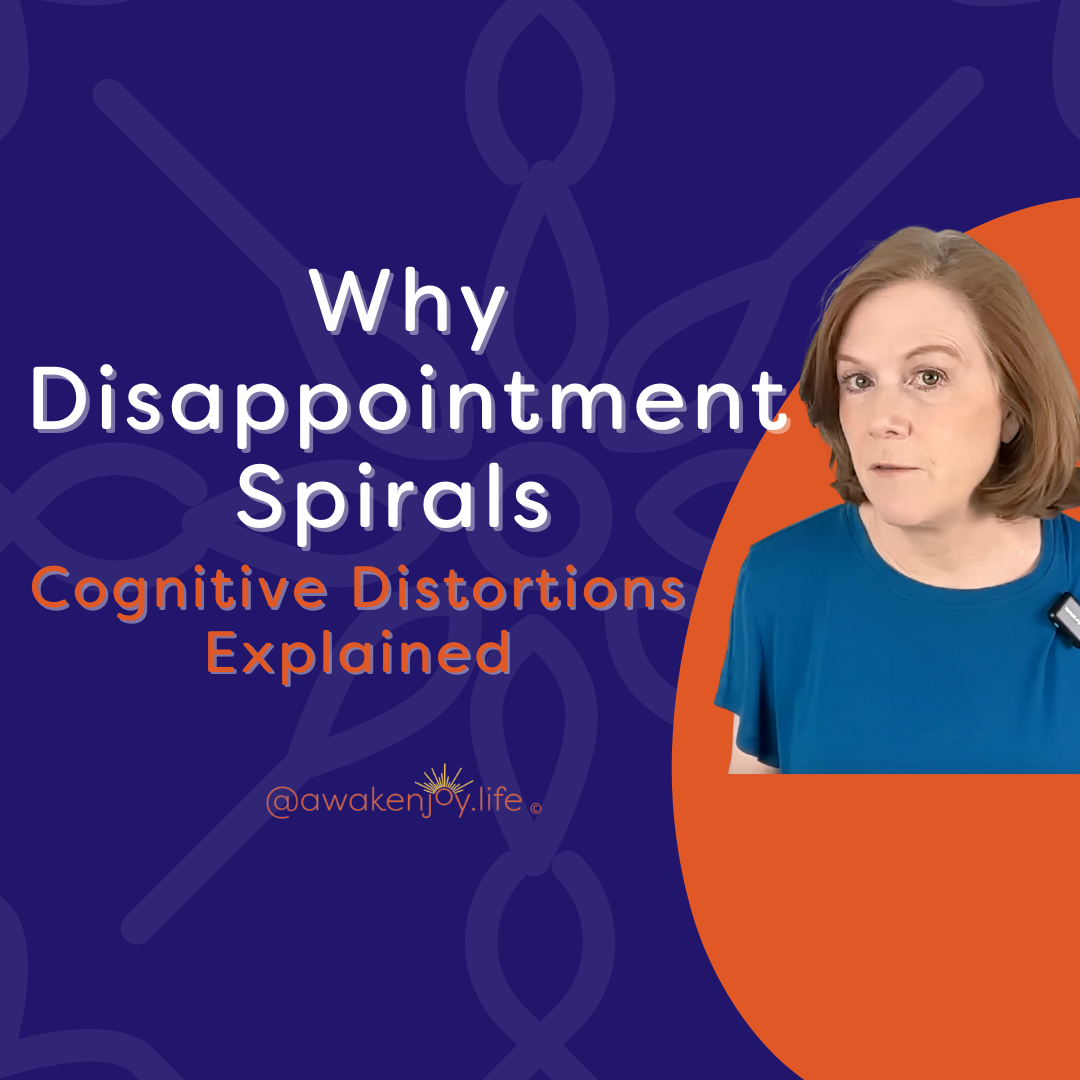
For some people, disappointment becomes a catalyst for growth. For many others, it triggers a descent into increasingly negative thinking patterns. The negative thinking reflects deep-seated negative core beliefs and is riddled with cognitive distortions—systematic errors in reasoning that distort reality and intensify emotional pain. Today I want to explain how cognitive distortions fuel the downward cycle. I will help you recognize these distortions in real time and provide practical tools so you can interrupt this cycle. Ideally, you will be able to extract useful information from disappointment. But even if you cannot get there yet, at least we can stop the downward spiral. How Disappointment Triggers Cognitive Distortions Something does not work out—something you hoped for, wanted, or needed does not happen the way you wanted. That leads to disappointment. Then your brain constructs a story about why the disappointment happened and how you should feel about it. Very often that story centers on what is wrong with you . We can move rapidly from disappointment to believing that the event not working out proves our negative beliefs about ourselves: "I am defective, I am not good enough, I am unlovable." The Cognitive Distortions That Fuel the Spiral Cognitive distortions are rigid, patterned ways of thinking. They can affect us across many areas of life. It is valuable to know which are your "go-to" cognitive distortions so that you can begin to recognize them when they occur. You become more aware of the thinking pattern and can observe, "There I go again. I am labeling. I am personalizing." That recognition creates distance between the thought pattern and our reaction to it. We are creating psychological space for ourselves and developing the observer mind—that wise part of the brain that notices these patterns and can evaluate them: Is this helpful? Is this not helpful? Personalization Personalization is when we take an event and make it about us—about our worth, our character, or what we did wrong—even when there are many other factors at play. A friend canceled plans, and we jump to the thought "they do not like me", or "I did something wrong the last time I saw them. We don't get a job we wanted, and we jump to "I am incompetent" or "nothing good ever happens to me because I do not deserve it, because I am not worthy." The event becomes personalized. I can hear you thinking that these things are personal. Yes and no. They personally happen to you, but if a friend cancels plans, there are countless possible reasons. The same applies when we do not get a job—there is much that is random and beyond our control. Labeling Labeling is when we reduce ourselves (or others) to a single defining characteristic, taking complex people and complex situations and drilling them down to one statement that supposedly covers everything. I" am defective." "I am incompetent." Labeling is a cognitive distortion because reality is never that simple. By nature, such statements are exaggerated and inaccurate. Overgeneralization Overgeneralization is when we take a single negative event and extrapolate it into a permanent, universal pattern. "I did not get this job, therefore I will never get a job." "I had a couple of dates with that person and really liked them, but they decided not to see me anymore, therefore I will never find a partner." A single negative event is extrapolated into a permanent pattern: this is how it will always be. Emotional Reasoning Emotional reasoning is when we assume that because we feel something intensely, it must be true. We draw conclusions based solely on our current emotional state rather than on evidence. "I feel like a failure, therefore I am a failure." "I feel right now like nothing will ever work out for me, therefore nothing will work out for me. I will defend this belief both to myself and to others because if I feel it this intensely, it must be true." But our feelings reflect our current emotional state. They are not predictors of the future. Emotional reasoning occurs when we draw conclusions based solely on how we feel in the moment, and usually those conclusions contain other cognitive distortions, such as catastrophizing.. Catastrophizing Catastrophizing is a cognitive distortion that conjures a worst-case scenario and then treats it as 100% certain to occur. As we catastrophize, our primitive brain, which controls much of our neurochemistry—our stress chemicals, our feel-good chemicals—does not distinguish between our catastrophic imaginings and reality. It does not recognize these stories as fiction. We often generate the stress chemicals that correspond to the catastrophic story. Those stress chemicals then amplify the rest of the cycle. Sometimes these are also shutdown chemicals that leave us feeling numbed or wanting to collapse. Catastrophizing almost invariably accompanies this type of reaction to disappointment. All-or-Nothing Thinking All-or-nothing thinking is when we see things in extreme, black-and-white terms with no middle ground. If something is not perfect, it is a complete failure. All-or-nothing thinking can create avoidance, which impacts our behavior. "I am not going to get a job like that, so why bother?" "I should not try to improve my situation at all. I will probably just be disappointed again, so I will not even try." This pattern is extremely common. Avoidance can lead to chronic disappointment and genuine hopelessness. Last week's video addressed chronic disappointment and its impact (you can find the blog here and the video here ). This avoidance constricts our world. We do not pursue what we want. We may even sever our connection to wanting because all wanting has ever done is cause pain. The Role of Negative Core Beliefs If you listen carefully to all these examples, you can hear that the themes are tied to negative core beliefs: I am defective, I am not good enough. Sometimes they are negative beliefs about the world: Nothing will ever work out for me. True healing requires addressing these very core negative beliefs. I have several videos on this topic, and I also have a free PDF that helps you identify your specific negative belief and provides three tools to begin transforming it. Five Tools to Break the Cycle Tool 1: Build Awareness We cannot change what we are not aware of. This week when you experience disappointment, which you likely will, notice where your thinking goes and see if it corresponds to any of the cognitive distortions I mentioned. If you are able to identify a cognitive distortion, label it: this is catastrophizing, this is all-or-nothing thinking, this is personalization. Even if you cannot stop the distortion, simply labeling it creates the distance between you and your thoughts. You can combine this with labeling the feeling you are experiencing. Scientific studies demonstrate that labeling your thoughts and feelings aids emotional regulation. The simple act of labeling activates a different part of your brain—the prefrontal cortex—which helps calm the amygdala and the fight-flight-freeze response. Tool 2: Challenge These Thoughts With Reality Check Questions Ask yourself: Whatever I am imagining about the future, the disaster scenario I have constructed—is this happening right now? Is this guaranteed to happen? Is it 100% certain? Do I need the stress chemicals I am generating right now as I think about this? If it is not happening right now, I do not need these stress chemicals. Is there something I can do about this right now? Part of the reality check involves determining whether you can physiologically calm your body while thinking through whatever problem exists. There are always problems, and your disappointment likely stems from a real problem. Some of these problems are extremely important, but they do not require this kind of distorted thinking or these chemicals. What they require is full-brain problem-solving. Sometimes it is helpful to write down what we are feeling or thinking. If we feel too overwhelmed, we can decide, "I can't think this through right now, but I will schedule time tomorrow or the next day to think this through." As we write down what we are feeling and thinking, we can begin to identify any statements that reflect cognitive distortions. Once something is identified as a cognitive distortion, we can acknwoledge that it is not accurate. A distortion by definition means this. Even if it FEELS true, we can KNOW it is not. Simply creating distance by acknowledging that these automatically arising thoughts, which feel so true, are actually distorted, can be powerful. Obviously a therapist can be invaluable in this work. An outside perspective can bring richness that we cannot access when we are cycling through the same thoughts repeatedly. I encourage you, if you have access to quality therapy and you struggle with this, to reach out. Tool 3: Identify the Negative Core Belief See if you can identify common themes in how you think about recent disappointments. Identify the negative core belief driving those cognitive distortions, the negative core belief driving your response to disappointment. Healing these negative core beliefs cannot be accomplished with a brief article. It may require long-term therapy. It is profoundly worthwhile to undertake the investigation and healing work. In working with people over 20 years as a psychotherapist, I found that addressing this was one way to reach the root issues driving most problems. There is a common thread, and it traces back to a traumatic event in childhood or a difficult situation that fostered negative beliefs about ourselves. I have a free PDF that lists very common negative core beliefs. It guides you through a process to identify your key negative core belief and provides three tools to begin transforming it. Click here for the PDF. Tool 4: Develop a Reasonably Stated Positive Core Belief that Counters the Negative Reasonably stated means you do not need to leap from "I am completely unworthy" to "I am the most worthy person in the world." We do not need to go from "I am stupid" to "I am brilliant." It is simply "I am smart enough, I am worthy enough, I am as worthy as any other human being." There are many reasons we phrase this with moderate language, but primarily because our brain will argue against absolute positives. Curiously, our brains do not argue against absolute negatives. "I am stupid, I am worthless"—somehow our brain accepts that. But if we propose the exact opposite, our brain will reject it immediately. So: I am smart enough, I am good enough, I am lovable enough. Develop the positive core belief. The PDF I mentioned also assists with this step . Once you develop it, write a list of evidence that the reasonably stated positive core belief is true. Tool 5: Identify Action Steps If you believed that reasonably stated positive core belief, what action would you take? I know you probably do not believe the positive statement at this point, but imagine: if you believed it, what would you do? If this is too hard to imagine, think about someone else who believed they were good enough—what would they do? Then push yourself to do this action. What is the worst outcome? You feel disappointed. If we could sit with our disappointment, allow ourselves to feel it, acknowledge that we dislike it and it feels terrible, but recognize that all emotional states are temporary—if we allow them to process through, they will pass. If we suppress them or push them away, they can become rigidly stuck. Generally, if we allow ourselves to feel disappointment, the feeling will ebb and flow. If we develop even a slight sense of "I can handle being disappointed," that alone will interrupt the negative cycle. I hope this was helpful and I will see you next week!

